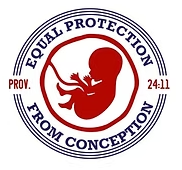Why I Am an Abortion Abolitionist and not an Incrementalist.
Abortion is one of the most divisive issues of our time, yet I firmly believe it is a practice that must be abolished—not merely regulated or restricted, but ended entirely. As an abortion abolitionist, my position is rooted in a deep conviction that life begins at conception and that every human being, born or unborn, possesses inherent dignity and rights. This article outlines why I hold this view, drawing from Biblical truths, Constitutional principles, and practical considerations that demand a clear and uncompromising response.
Biblical Reasons
The foundation of my abolitionist stance rests on Scripture, which reveals God’s unambiguous view of human life. First, the Bible affirms that life begins at conception and that the unborn are fully human. Psalm 139:13-16 declares, “For you formed my inward parts; you knitted me together in my mother’s womb. I praise you, for I am fearfully and wonderfully made.” Here, David recognizes that God is actively involved in creating life from its earliest stages, endowing it with purpose and value. Similarly, Jeremiah 1:5 states, “Before I formed you in the womb I knew you, and before you were born I consecrated you.” God’s knowledge and calling extend to the unborn, underscoring their personhood.
Second, Scripture commands the protection of the innocent. Exodus 20:13, “You shall not murder,” is a clear directive that applies to all human life, including the defenseless in the womb. The shedding of innocent blood is an abomination to God (Proverbs 6:16-17), and abortion, which ends millions of lives each year, falls squarely under this condemnation. Finally, Christians are called to defend the weak and oppressed (Psalm 82:3-4), a mandate that compels us to speak for those who cannot speak for themselves—the unborn.
These Biblical truths leave no room for compromise. If God values life from conception, then abortion is not a matter of personal choice but a violation of divine law.
Constitutional Reasons
Beyond Scripture, the United States Constitution provides a legal framework that supports the abolition of abortion. The Declaration of Independence, which underpins our nation’s founding principles, asserts that all people are endowed with “unalienable Rights,” including “Life, Liberty and the pursuit of Happiness.” The Fifth and Fourteenth Amendments echo this by guaranteeing that no person shall be deprived of life without due process of law. Yet, the unborn are denied this fundamental right, despite being human beings with their own unique DNA and potential.
The landmark case Roe v. Wade (1973), which legalized abortion nationwide, relied on a flawed interpretation of privacy rights rather than addressing the personhood of the unborn. The overturning of Roe in 2022 via Dobbs v. Jackson Women’s Health Organization returned the issue to the states, but this is insufficient. Abolitionists argue that abortion is not a states’ rights issue but a human rights violation that demands federal protection, just as slavery required abolition through the Thirteenth Amendment. The Equal Protection Clause of the Fourteenth Amendment further obligates us to extend legal protection to all persons, including the unborn, without discrimination.
If the Constitution exists to secure justice and liberty for all, then abortion— which denies life to the most vulnerable—stands in direct opposition to its core principles. Abolition is the only consistent Constitutional response.
Necessary Considerations
While Biblical and Constitutional arguments provide the foundation, practical considerations reinforce the urgency of abolition. First, the sheer scale of abortion demands action: since Roe, over 63 million unborn lives have been lost in the United States alone. This is a conservative estimate, with the reality being likely that far more have died. This is not a peripheral issue but a moral crisis akin to historical atrocities like slavery or genocide. Second, incremental approaches—such as restricting late-term abortions or imposing waiting periods—while well-intentioned, fail to address the root injustice. These measures implicitly concede that some abortions are permissible, undermining the principle that all unborn lives are equal in value.
Third, we must consider the cultural and spiritual consequences of tolerating abortion. It desensitizes society to the sanctity of life, paving the way for further devaluation of the vulnerable, such as the elderly or disabled. Finally, abolition requires courage and clarity in the face of opposition. It means rejecting political pragmatism and advocating for immediate, total justice, even when it’s unpopular. The abolition of slavery faced similar resistance, yet history vindicates those who stood firm.
Conclusion
In light of these Biblical, Constitutional, and practical reasons, I am an abortion abolitionist because anything less betrays the truth about human life. Every Christian should join this cause. Scripture commands us to uphold justice and defend the helpless, and our faith leaves no room for neutrality on an issue of such moral weight. Just as Christians historically opposed slavery, we must now rise to abolish abortion—not as a distant goal, but as an urgent calling. To follow Christ is to champion life, and to champion life is to demand the end of abortion in our time.

